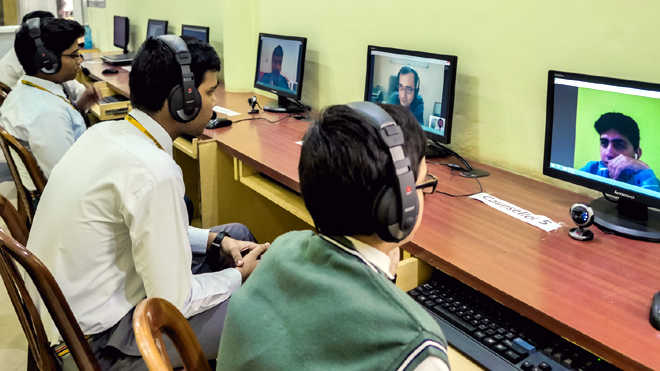Asheesh Gupta
Students, parents and academicians are in a dilemma today because jobs, which earlier seemed sensible and secure, have now become unreliable and increasingly irrelevant. ‘Bulk Placements’ have shrunk and are seeing significant drops their hiring significantly. In 2016 and 2017, there was a reported 15 to 35 per cent decrease in placements of technology, engineering and management graduates.
The reasons for this shift are manifold but two stand out. First is the unprecedented speed with which technology has entered people’s lives and businesses in the last decade. With data sciences, Artificial Intelligence, Machine Learning and e-commerce human intervention for standard, repetitive, intuitive or operational work is reducing. It doesn’t, however, mean that there are not enough jobs. What it means is that organisations now need people who can think, ideate, problem solve, communicate and collaborate beyond what technologies and machines can do, skill-oriented people.
Second is the response of the education institutions to this rapid change in the world of work and business. One of the reasons that students today are beginning to get concerned about their future is because most education institutions have been unable to stay updated and develop essential skills of their students.
In this situation, what is the role of education institutions in preparing students for this transition in the real world? What should students and their parents keep in mind when selecting an institution to pursue their higher education dreams?
It’s not about placements
It is important to understand that placing students in that first job is not preparing them to succeed and excel in that job later. The role of the Placement Committees and Cells is to shape students that the companies desire to hire. It is more than counting how many courses we taught, how many exams they answered and how many classes they attended.
Of course, getting a job is important but being able to get the right opportunities, we need tounderstand the industry and business needs. ASSOCHAM reported recently that only 7 per cent of Indian management graduates, outside of the top 20 institutions, are employable and the numbers are similar or worse for technology and engineering graduates.
This happens because we see placements as a task, not a process. Let us compare this process to that of product development. To mitigate the risk of an unsuccessful product, we brainstorm, evaluate the market, analyse consumer needs, prototype and test before we finally launch. Thus, if we can do this for developing products, here we are developing careers of young people! We need to visualise the end product, the student, and work backwards to provide room for application, experimentation and practice.
Thus, the new brand of assistance, at some modern educational institutions, has shifted from placements to career services or career assistance. Some institutions in India that have adopted this new and essential way of holistic development for their students are IIT Gandhinagar, the Indian School of Business, Hyderabad, JK Lakshmipat University, Jaipur, The Young India Fellowship, Anant National University and some more. They are focusing on this new brand that provides holistic development and guidance versus simply, placement.
One size doesn’t fit all
With the IT boom in the past decade, students from mechanical, chemical, electrical or any other specialisation found themselves in IT services jobs. The narrative was simple – take it or leave it.
Now, this was after spending lakhs of rupees on their degrees. As a result, we don’t just have a nation of unemployable but also unhappy youth.
Different students have different strengths and areas of interests. They are interested in jobs, further studies, fellowships, scholarship programmes, entrepreneurship and so on. It is important that institutions work to identify and map these interests and strengths progressively throughout their journey and look for areas where they can work with passion and drive. The career services teams in many cutting-edge institutions are, therefore, working with students to explore and customize job, entrepreneurship or higher education opportunities.
Begin at the beginning
Crash courses on placement preparation in the last year or semester is neither enough nor sustainable. Learning is a process and building the ‘product’ begins at the beginning, right from when they are inducted. Building on skills should be strategically divided across their degree programme and provide them an opportunity to apply the learning.
Learn from example
Institutions must be aware that the experiences we can provide with knowledge resources available are limited. The exposure can be broadened by greater interface with the real-world of work experience through guest sessions, visiting faculty members, longer internships, live projects, mentors and many more channels. It not only inspires them but also exposes them to see outside the safe bubble of their campus. Indian School of Business, for example, pioneered this idea from the outset and is now the only management programme to represent India with top global programmes. This helps the ‘product’ stay closer to reality – closer to what the ‘market’ needs.
— The writer is Pro-VC, JK Lakshmipat University, Jaipur
Unlock Exclusive Insights with The Tribune Premium
Take your experience further with Premium access.
Thought-provoking Opinions, Expert Analysis, In-depth Insights and other Member Only Benefits
Already a Member? Sign In Now











